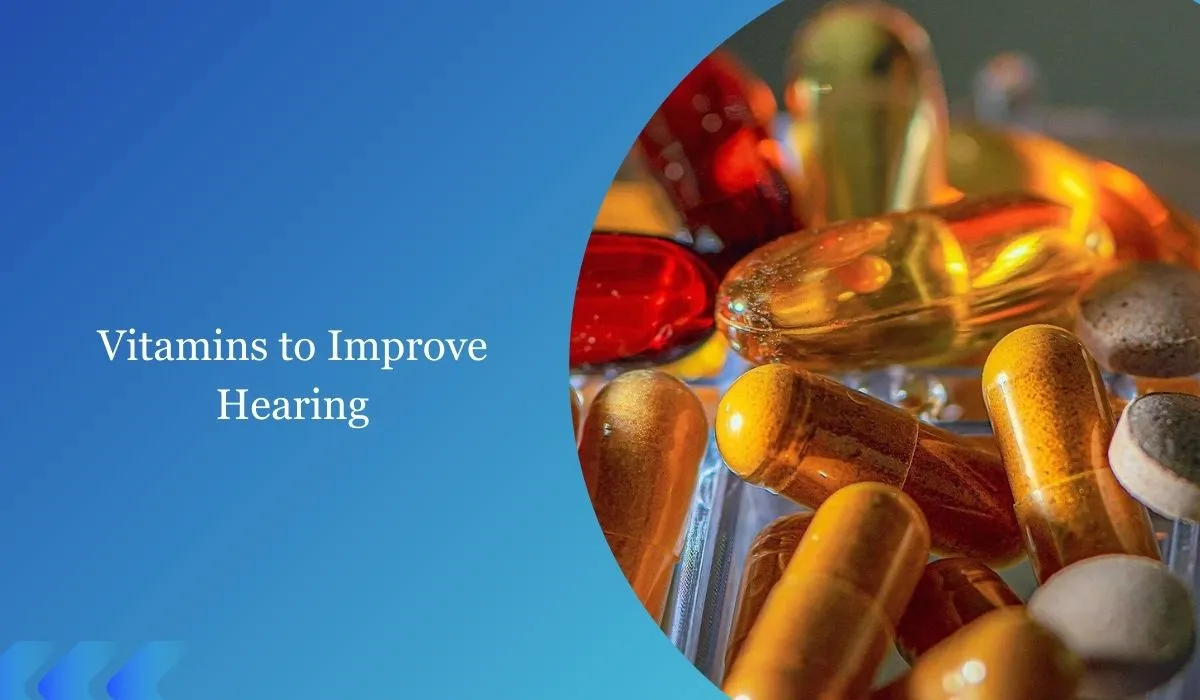Vitamins to Improve Hearing: What You Need for Optimal Ear Health
Certain vitamins, like vitamin D, vitamin B12, and folic acid, are believed to support ear health and may improve hearing by reducing inflammation, supporting nerve function, and promoting blood circulation in the auditory system.

Disclaimer: Our recommendations are sincere, driven by the products’ benefits. When you buy through our links, we may earn a commission, backing our testing and development at no extra cost to you.
Our ability to hear and process sounds is a crucial aspect of our daily lives, allowing us to communicate, enjoy music, and remain connected to the world around us. However, as we age or due to various factors, our hearing can gradually decline, leading to difficulties in understanding speech, appreciating music, or even feeling isolated. Fortunately, proper nutrition, including the right vitamins to improve hearing, can play a significant role in maintaining and potentially enhancing our auditory health. In this article, we’ll explore the essential vitamins that can benefit your hearing and how to incorporate them into your diet.
The Role of Vitamins in Hearing Health

Our ears are complex and delicate structures that rely on various nutrients to function properly. Certain vitamins are particularly important for maintaining the health of the inner ear, the auditory nerve, and the pathways involved in processing sound. These vitamins can help protect against damage, support the regeneration of hair cells (the sensory receptors responsible for converting sound waves into electrical signals), and promote overall auditory function.
While a balanced diet rich in fruits, vegetables, and whole grains can provide many of the necessary vitamins, some individuals may benefit from supplementation, especially if they have specific nutritional deficiencies or increased needs due to age or medical conditions.
Vitamins to Improve Hearing
- Vitamin C – Vitamin C is a powerful antioxidant that plays a crucial role in protecting the inner ear from damage caused by free radicals and oxidative stress. It also supports the health of the tiny hair cells within the cochlea, which are responsible for converting sound waves into electrical signals that the brain can interpret. Additionally, vitamin C has been shown to improve blood flow to the inner ear, ensuring proper nutrient delivery and oxygenation.
- Vitamin E Like vitamin C, vitamin E is an antioxidant that helps protect the delicate structures of the inner ear from oxidative damage. It also plays a role in maintaining healthy blood circulation, which is essential for delivering oxygen and nutrients to the auditory system. Some studies have suggested that a combination of vitamins C and E may be particularly effective in supporting hearing health.
- Vitamin B12 Vitamin B12 is essential for the proper function of the auditory nerve, which transmits electrical signals from the inner ear to the brain for processing. A deficiency in vitamin B12 can lead to nerve damage, potentially affecting hearing abilities. Additionally, this vitamin is involved in the production of myelin, a protective sheath that surrounds nerve fibers, ensuring efficient signal transmission.
- Folate (Vitamin B9) Folate, also known as vitamin B9, plays a role in supporting the overall health of the auditory system. It helps protect against age-related hearing loss by preventing the buildup of homocysteine, an amino acid that can damage blood vessels and nerves, including those involved in hearing. Folate also supports the regeneration of hair cells in the inner ear, which can be damaged by loud noises or aging.
- Vitamin D While not directly related to the auditory system, vitamin D is essential for maintaining strong bones, including those in the inner ear. Adequate vitamin D levels can help prevent the development of osteoporosis, a condition that can lead to an increased risk of hearing loss due to changes in the bone structure surrounding the inner ear.
Incorporating Vitamins to Improve Hearing into Your Diet
Fortunately, many of the vitamins essential for hearing health can be found in a variety of nutrient-rich foods. Here are some dietary sources of these important vitamins:
- Vitamin C: Citrus fruits, bell peppers, broccoli, tomatoes, and strawberries.
- Vitamin E: Almonds, sunflower seeds, spinach, avocados, and plant-based oils.
- Vitamin B12: Animal products like meat, fish, eggs, and dairy, as well as fortified cereals and plant-based milk alternatives.
- Folate: Leafy green vegetables, legumes, oranges, and fortified grains.
- Vitamin D: Fatty fish like salmon and tuna, egg yolks, and fortified dairy products. Additionally, our bodies can produce vitamin D from exposure to sunlight.
If you have difficulty meeting your vitamin needs through diet alone, or if you have specific deficiencies or increased requirements, your healthcare provider may recommend a high-quality supplement to ensure adequate intake of these essential nutrients.
Potential Side Effects and Precautions
While vitamins are generally considered safe when consumed in recommended amounts, it’s important to be aware of potential side effects and precautions when taking supplements or consuming excessive amounts of certain vitamins.
- High doses of vitamin C, for example, can cause digestive issues such as diarrhea, nausea, and abdominal cramps. Excessive vitamin E intake has been linked to an increased risk of bleeding, particularly in individuals taking blood-thinning medications.
- Vitamin B12 and folate are typically well-tolerated, but it’s essential to consult with a healthcare professional if you have any underlying medical conditions or are taking medications that may interact with these vitamins.
Additionally, it’s crucial to remember that vitamins should not be considered a substitute for seeking medical attention or treatment for hearing loss or other auditory problems. If you experience significant difficulties with your hearing, it’s recommended to consult with a qualified healthcare professional for proper evaluation and appropriate management.
Conclusion
Incorporating the right vitamins to improve hearing into your diet can be a valuable strategy for maintaining and potentially enhancing your auditory health. Vitamins such as C, E, B12, folate, and vitamin D play crucial roles in protecting the delicate structures of the inner ear, supporting nerve function, and promoting overall auditory well-being.
By consuming a balanced diet rich in nutrient-dense foods or considering high-quality supplements under the guidance of a healthcare professional, you can help nourish your ears and potentially reduce the risk of age-related or noise-induced hearing loss.
Remember, while vitamins can be beneficial, they should be considered part of a comprehensive approach to maintaining overall health, including regular exercise, stress management, and protecting your ears from excessive noise exposure.
Randi Leigh Carter
Randi Leigh Carter is a licensed audiologist with over 15 years of experience in treating hearing health issues. She holds a Doctor of Audiology (Au.D.) degree from the University of Miami and is certified by the American Speech-Language-Hearing Association (ASHA). As the founder and director of Clarity Hearing Solutions, a leading audiology practice in South Florida, Dr. Carter specializes in the assessment, diagnosis, and treatment of a wide range of hearing disorders, from age-related hearing loss to tinnitus and auditory processing issues. She is passionate about helping her patients improve their quality of life through personalized hearing care. In addition to her clinical work, Dr. Carter is a respected researcher and speaker. She has published numerous articles in peer-reviewed journals on topics such as the impact of hearing loss on cognitive function and the use of advanced hearing technologies. She is also a frequent presenter at national and international audiology conferences, sharing her expertise and insights with her colleagues. Beyond her professional achievements, Dr. Carter is deeply committed to community outreach and education. She volunteers with local organizations to provide free hearing screenings and hearing aid assistance to underserved populations. She also serves on the board of directors for the Florida Academy of Audiology, where she works to advance the field and advocate for better hearing healthcare policies.
